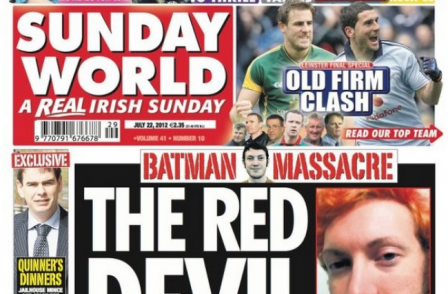A newspaper has been censured by the Press Complaints Commission for publishing a photograph of a woman sunbathing topless – which it had used before.
It upheld a complaint made through solicitors by June McKibbin over a story which appeared in the Sunday World on 16 June last year under the headline: "Deadly duo…woman knows who killed my brother".
The article reported the claims of a murder victim's sister that McKibbin might have information about her brother's death because of her past friendship with a woman named Nuella Fitchie, now deceased, who was suspected of involvement in the crime.
The story was illustrated with a photograph of both McKibbin and Fitchie sitting topless by a swimming pool.
According to the PCC McKibbin said that this was a private photograph, taken whilst she was on holiday with Fitchie a number of years ago, which disappeared while stored at a friend's house in the late 1990s.
The PCC said it had previously been published by the Sunday World, but she had not complained then as she had left the country and felt powerless to address the issue.
Publication of the photograph was intrusive and embarrassing, particularly alongside derogatory references to her as a "bimbo", she told the PCC.
The newspaper told the PCC the complaint was spurious, noting that no complaint had been raised in relation to its previous use of the image. It provided copies of the historical coverage, published in 2008, and an extract from a book written by its editor and published in 2001, in which the photograph was published alongside various allegations about the complainant.
The Sunday World told the PCC that the photograph had been provided by a confidential source. In an effort to resolve the complaint it said it offered the PCC an assurance that it would not re-use the portion of the image that showed the complainant.
The commission said that Clause 3 of the Editors' Code of Practice, covering privacy, said "editors will be expected to justify intrusions into any individual's private life without consent".
"This was unquestionably a personal photograph, published without consent. While there was a potential public interest in the publication of a photograph that demonstrated the nature of the relationship between the complainant and Ms Fitchie, this did not extend to its publication in unpixelated form, which was likely to cause the complainant gratuitous embarrassment and upset – as it had done – and did not serve any legitimate aim.
"The commission has recognised in the past that, on occasion, potentially intrusive material can be so well-established in the public domain through prior publication that censure for further re-publication is untenable. The code provides for such a finding, as it states that the commission will 'consider the extent to which material is already in the public domain'.
"On this occasion, however, the prior publication was limited: two previous occasions over the course of a decade, both connected with the newspaper under complaint. This fell well short of justifying its re-use. To rule otherwise might imply that a publication was entitled to rely on a historical intrusion in support of a current one, which could not be correct. The complaint was upheld."
It went on: "The code provides for such a finding, as it states that the Commission will 'consider the extent to which material is already in the public domain'.
"On this occasion, however, the prior publication was limited: two previous occasions over the course of a decade, both connected with the newspaper under complaint.
"This fell well short of justifying its re-use. To rule otherwise might imply that a publication was entitled to rely on a historical intrusion in support of a current one, which could not be correct."
Email pged@pressgazette.co.uk to point out mistakes, provide story tips or send in a letter for publication on our "Letters Page" blog

